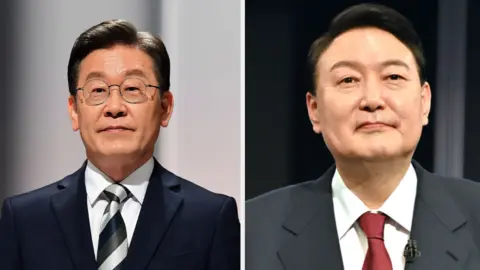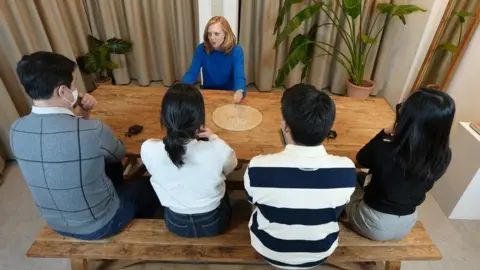Why misogyny is at the heart of South Korea's presidential elections
 Getty Images
Getty ImagesPark Min-young, 29, spends most of his day talking to angry young men in Seoul.
His fingers relentlessly tap the keyboard as he replies to dozens of their messages at his desk in the centre of a busy campaign office for one of South Korea's main presidential candidates, Yoon Suk-yeol.
"Nearly 90% of men in their twenties are anti-feminist or do not support feminism," he tells me.
South Korea has one of the worst women's rights records in the developed world. And yet it is disgruntled young men who have been the focus of this country's presidential election.
Many do not see feminism as a fight for equality. Instead they resent it and view it as a form of reverse discrimination, a movement to take away their jobs and their opportunities.
It is a disparaging development for the tens of thousands of young women who took to the streets of Seoul in 2018 to shout "Me Too" after several high profile criminal cases involving sexual harassment and spy camera crimes known as "molka".
But now that cry is being drowned out by men shouting "Me First".
The country's gender politics is a minefield the country's next leader will have to navigate - if they can first win the battle to get into office.
The contest
Conservative candidate Mr Yoon and his liberal rival Lee Jae-myung are neck and neck in a contest to become the next leader of Asia's fourth largest economy.
Voters' top concerns are skyrocketing house prices, stagnant economic growth, and stubborn youth unemployment.
Neither have any experience as legislators in the National Assembly which is a first in South Korea's democratic history.
And neither appear to have a strong female voting base. Both parties have been accused of misogyny.
 Getty Images
Getty ImagesMr Lee's ruling Democratic Party has seen a number of high-profile sexual harassment scandals, with the mayor of Busan sent to prison for sexual assault.
Mr Yoon, of the People's Power Party, has made abolishing the Ministry of Gender Equality and Family a central pledge of his campaign.
The ministry largely provides family-based services, education, and social welfare for children and spends around 0.2% of the nation's annual budget - less than 3% of which goes towards the promotion of equality for women. But Yoon knows this move will be popular among a key demographic - young men.
A survey last year by a local newspaper found that 79% of young men in South Korea feel "seriously discriminated against" because of their gender.
As I walk with Min-young to a cafe to meet some of these young men, he tells me that "feminism has been going in the wrong direction".
He says many men he's spoken to feel "let down", adding that he believes it is "necessary to pacify, to convince and to appease them first".
These men claim that they are not trying to drown out the voices of women, but simply to amplify the voices of young men.
One of their biggest issues is that all men must serve 18 months in the military before they are 30 years old.
"There is no reward. Just sacrifice," says Min-young. "The military is a huge fear for Korean men… that they are forced to go to this place they can't resist for one year and six months. And to have to compete with women after returning from the military.
"This country's patriarchy system also gives women the burden of child rearing, [which means the] men have the burden [of proving] their economic capabilities."
The men I'm introduced to do stump speeches for Mr Yoon who has declared that there is no systemic gender discrimination in South Korea.
The facts do not support that argument.
The average monthly wage for a South Korean woman in 2020 was 67.7% of that of a man, according to the Ministry of Employment and Labour. This is the biggest wage gap among developed countries.
Feminists living in fear
Women make up only 5% of boards in South Korea's corporate world.
When it comes to sexual crimes against women, sentencing has been traditionally low. In the last 10 years 41.4% of perpetrators were given probation, around 30% were given a fine.
That means just over 28% of those found guilty were sent to prison.
The pains of young women however, have been largely ignored in this election. Until now.
A writer for the Korea Herald, Yim Hyun-su noted in an article at the weekend that both candidates have refreshed their appeal to women on social media.
Mr Lee has pledged to tackle discrimination and Mr Yoon declared a "war on sex crimes".
In such a close race, it seems they have realised that young women may now hold the deciding votes.
But it will be a tough sell for those who fight for equality in South Korea. They are now scared to reveal their identities.
We spoke to a group of two men and two women who wanted to face away from our cameras. We have given them fake names to protect them.

"As a feminist to reveal your face and speak out has such unimaginable consequences," says Ji-eun, a YouTuber who is in her early 20s.
"When we upload a video on feminism on our YouTube channel, male communities organise an attack and say things like 'You are a feminist? Feminists should all die.'
I have seen these comments for myself. This malicious online bullying can have terrible consequences.
In January, YouTuber BJ Jammi ended her life having endured years of abuse after trolls accused her of being a "man-hating feminist".
But amidst the deepening divisions, there is understanding too. Especially when it comes to men having to serve in the military.
"I sympathise with that and the fact that only males have to go is an unjust structure," said Ji-eun.
"But the responsibility for this should be on the government and the history of this divided country - but to say to women in their twenties 'Well, you don't go to the military' is very unjust."
This anti-feminist backlash will be a challenge for whoever steps into the presidential office known as the Blue House.
South Korea is at a cultural crossroads. It has a tech-savvy young generation who do not share the patriarchal views of their parents or their grandparents. Both genders will likely keep pushing and are looking at those in charge to bring real change.
But Ji-eun still feels hopeless about her future.
"If the hate was coming from the older generation, I might hope that at some point when my generation is in power or in places of importance in society, it could change. But the anti-feminists and those who don't care about women's rights and spewing hate are in my generation.
"It's hard to picture a bright future even far ahead."
